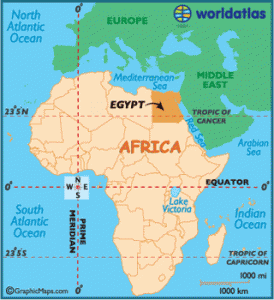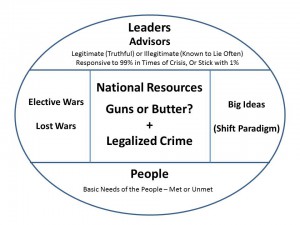
Egypt: The Army vs. the President. After two days of huge anti-government demonstrations, the Minister of Defense on behalf of the armed forces issued an ultimatum to President Mursi and the opposition to settle the unrest in 48 hours. The statement is reported in full English translation so that Readers may appreciate the entire context. Emphasis added by NightWatch.
“In the name of Allah, the Most Merciful, the Most Compassionate”
“Statement from the General Command of the Armed Forces”
“The Egyptian arena and the whole world witnessed yesterday protests and rallies by the great Egyptian people to express their opinion and will in an unprecedented peaceful and civilized way.”
“All people saw the Egyptian people's movement and heard their voice with the utmost degree of respect and attention. It is inevitable that people will receive a reply to their movement and call from every party that should bear a part of responsibility amid these dangerous circumstances that surround the nation.”
“The Egyptian Armed Forces, as a main party to the future equation, and out of their national and historical responsibility for protecting the nation's security and safety, stress the following:
The Armed Forces will not be a party to the circle of politics or rule, and they do not agree to deviate from the role drawn for them in the genuine democratic ideology derived from the people's will.”
The country's national security is exposed to a major danger, given the developments the country is currently going through. This puts responsibilities above us, according to the position of each one of us, to act properly to prevent these dangers.”
“The Armed Forces earlier sensed how the current circumstances are serious and the demands they carry to the great Egyptian people. So, they earlier gave one week for all political parties in the country to reach compromise and get out of the crisis, but that week has passed without the emergence of any sign or act, which led people to take to the streets with determination and perseverance and with their full freedom in this brilliant way that triggered astonishment, appreciation and attention at the domestic, regional and international levels.”
“The waste of more time will lead to nothing but more division and conflict, which we warned and still warn against.”
“These kind people suffered and found no one to have mercy upon them or be kind with them. This puts ethical and physiological burden upon the Armed Forces, which deem it necessary for all parties to stop doing anything but containing these proud people who proved their readiness to achieve the impossible if they feel honesty and devotion towards it.”
“The Armed Forces repeat and renew the call for meeting the people's demands and give everybody 48 hours as a last chance to shoulder responsibilities for the historical moment which the nation is going through, and it will not tolerate or forgive any party that fails to shoulder its responsibilities.”
“The Armed Forces tell all parties that if people's demands are not fulfilled within the set period, it will be incumbent upon them, based on their national and historical responsibility and in respect of the demands of the great Egyptian people, to announce a future roadmap and measures to be supervised by the Armed Forces in cooperation with all sincere and patriotic trends and parties, including youth who were and still are the spark of the glorious revolution, without exclusion of any party.”
“A salute of appreciation and honour to the sincere and loyal men of the Armed Forces who were and still are shouldering their national responsibility towards the great Egyptian people with full determination, persistence, pride and honour.”
“May God preserve Egypt and its great people.”
Comment: Although the Army took pains to craft a balanced document, the two statements about meeting the people's demands betray that this document targets President Mursi. The anti-Mursi opposition demands that Mursi to leave and that shortages end. The pro-Mursi crowds demand the opposition respect the results of Mursi's election.
In its effort to appear politically neutral, the army leadership issued what they know is an impossible deadline. That means they have a plan and intend to implement it. The ultimatum is not a hasty reaction to these demonstrations.
The reference to the roadmap reinforces the theme that the army leadership has been thinking about the way ahead and been planning and preparing for this very contingency, almost certainly since last December.
The army's stated intention is to be genuinely inclusive, a political condition to which Mursi only ever paid lip service.
The army leadership has warned on multiple occasions about the dangers of political discord leading to a breakdown of public order and warned that it might have to take action as part of its duty to provide state security. One of the earliest was in the first week of December 2012 during demonstrations over the constitutional referendum. Warnings against chaos and violence followed in January and February 2013.
Thus, the army leadership has had lots of time to consider scenarios and options. The Mursi regime has been tone deaf, relying on its electoral victory as a shield against military action. What is ironic is that President Mursi appointed the current army leadership that now threatens him.
Two implied messages that are highly significant are that no matter what Mursi orders, the army has stated that it will not fire on the demonstrators to support his government and will not back the police in doing so. That suggests the police probably will not attempt to control the crowds.
On the other hand, some army units have rules of engagement, independent of the presidency, to insert themselves between competing violent demonstrations to stop the violence. On 2 July army armored vehicles broke up a running gun battle between pro- and anti-Mursi groups in al-Fayyum city. When the armor appeared, the shooters dispersed.
Reaction. Mursi had a meeting with the top army leadership, including Defense Minister General Abd-al-Fattah al-Sisi. The regime later indicated that it will not give in to the threat of a military coup. The rebel movement, Tamarrud, welcomed the army statement and interpreted it as a statement of support.
Demonstrations. It is important to note that there have been competing pro- and anti-government demonstrations. The anti-government demonstrations appear to be larger, but are also getting more and more positive international press coverage.
On Sunday millions of people packed city squares nationwide. The opposition, Rebel, campaign issued a statement giving President Mursi until 5pm on Tuesday to step down, or the campaign would call on supporters to besiege both Ittihadiya and Qobba presidential palaces and to engage in civil disobedience.
On Monday, demonstrators ransacked the national headquarters of the Muslim Brotherhood in Cairo. Eight protesters were killed in this action. Witnesses said that in contrast to the largely peaceful protests in Cairo on Sunday, when at least two million people took to the streets, the attack on the headquarters building was brutal, and was repelled with even more brutality. The Brothers inside were armed.
Egypt's ministers of tourism, environment, communication and legal affairs tendered their resignations on. The four handed in their letters of resignation together to Prime Minister Hisham Qandil.
On 2 July, Muslim Brotherhood members refused to turn over to police a police officer they captured and beat.
Way ahead. The situation is incendiary, literally. The demonstrations are likely to turn much more violent.
Four characteristics are significant and distinguish this movement from the pro-democracy groups of 2011. First is the size of demonstrations. They appear much larger than the early demonstrations. It will be difficult to continue demonstrations of such size for long. On the other hand it will be difficult for the government to resist the pressure now that the army will not back the police.
Various opposition groups have achieved some semblance of organization. The demonstrations are not flash mobs, like those that started the so-called Arab Spring in Egypt and eventually were hijacked by the Brotherhood.
The opposition to Mursi is diverse. Demonstrators are a mix of age groups, secular interests, religious confessions and occupations. The main unifying factor is the failure of the government to keep its promises to fix the economy. For the political elite, the main issue is Mursi's high-handed, Islamist style of government. Mursi uses virtually all the tactics of Mubarak, plus the Brotherhood.
Multiple flash points exist. Some will come quickly. For example, Mursi seems unlikely to step down. The army ultimatum makes the dismissal of his government unavoidable. That would seem to pit the army and the anti-government opposition against the Brotherhood and its supporters.
Direct army government is not likely, but army-backed civilian rule is. Having experienced the problems of government under the Supreme Council of the Armed Forces after the overthrow of Mubarak, this cohort of generals is not disposed to take power directly. A more likely scenario is that it would back an interim government of experts, if Mursi decides to step down.
One remedy for instant power aggrandizement by the president is to draft a constitutional provision that makes the president a figurehead, as in Pakistan and Turkey, and vest executive power in a parliamentary cabinet.

Phi Beta Iota: The NIGHTWATCH overview is meticulous and sensible. We judge the situation in the USA to be incendiary as well — all that is lacking is a spark. There are two points of similarity between Egypt and the USA that bear noting: first, when the larger mass of people are aroused, the government has not alternative but to either respect their demands, or attempt — and in so doing fail totally — to eradicate the mobs which in the USA will incite large mobs, armed mobs. Second, the Army — not the Navy, Air Force, or even the Marine Corps — is the People's Army. Along with the National Guard and the consent of the Governors and legislatures of the various States and Commonwealths, only the US Army can safely set the stage for the impeachment of a President and the nation-wide recall of an entire Congress. We humbly submit that both the President of the United States of America, and the Chief of Staff of the U.S. Army, should be considering their options and talking to each other about the Stabilization & Reconstruction of the USA — the wealthiest failed state on the planet.

No one in the US Government is being responsible about coherently — holisitically — addressing all of the problems that have resulted from legalized financial crime against the middle class, along with the unanticipated impact of the Internet in making most middle management jobs redundant. The USA has many very severe problems, including drought, flooding, and nuclear facilities at risk of catastrophic failure, and most of those problems can be traced to programs that serve the few at the expense of the many — programs that lack ethical evidence-based decision-support. There is no focus at all on finding solutions to the most pressing domestic problems — the White House staff appears over-whelmed and distracted by foreign matters that should not be its concern, at the same time that there is no domestic policy team worthy of the name. OMB crunches numbers, it does not “manage” and it lacks a strategic analytic model or an embedded Open Source Agency with which to be effective on the merits.
See Also:
2011 Thinking About Revolution in the USA and Elsewhere (Full Text Online for Google Translate)



